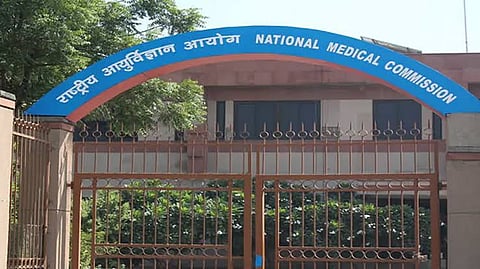
- News
- Campus
- Exam
- Podcast
- Web Stories
- Do You Know
- Path Finders - UG Programs
- Videos
- Book Review

In a recent report, The Lancet published sharp criticism of what it perceived as “systemic corruption and inefficiencies” within the National Medical Commission (NMC).
The prominent medical journal's report, which was released on July 19, raised concerns about the integrity of medical education and, as a result, the future quality of healthcare in the country.
This comes after a corruption scandal broke out involving India's leading medical education body. On June 30, the Central Bureau of Investigation (CBI) filed a criminal case against 34 people, including officials from the Ministry of Health and Family Welfare, the NMC, and a few doctors in charge of inspecting Shri Rawatpura Sarkar Institute of Medical Sciences and Research in Nava Raipur, LiveMint reports.
The scandal was unearthed after searches in over 40 locations across five states. The CBI findings show how government officials collaborated with private medical colleges to influence the regulatory process.
Three NMC inspectors and three officials from Shri Rawatpura Sarkar Institute of Medical Sciences and Research in Nava Raipur were detained during an exchange of Rs 55 lakh. The NMC inspectors allegedly took a bribe to approve the college.
According to the CBI, health ministry officials obtained unauthorised access to secret information about medical institutions' regulatory status, such as inspection dates and team compositions. The information was communicated with intermediaries, who then alerted the relevant medical colleges.
As per the FIR by the CBI, this information was used to bribe assessors for favourable ratings, appointing proxy or ghost faculty, or admitting fake patients "to artificially project compliance" during inspections.
This scandal demonstrates that NMC "lacks a clear action plan and is hindered by centralised power and bureaucratic inefficiencies,” the Lancet report states.
Regarding NMC’s efforts to increase the number of MBBS seats in India to meet doctors’ shortage, The Lancet report states, “Under pressure to rapidly expand undergraduate and postgraduate seats without long-term vision or adequate capacity, the NMC has increasingly mirrored the functioning of the (discredited predecessor) MCI.”
To recall, the Medical Council of India (MCI) was replaced by the National Medical Commission (NMC) in 2019 to address concerns about corruption, lack of transparency, and inefficiency within the council.
The report stated that the quality of future doctors will suffer if the NMC focuses exclusively on quantity, affecting healthcare delivery.
It further emphasises the crucial need for the NMC to maintain and enforce medical education standards to protect public health in India.
